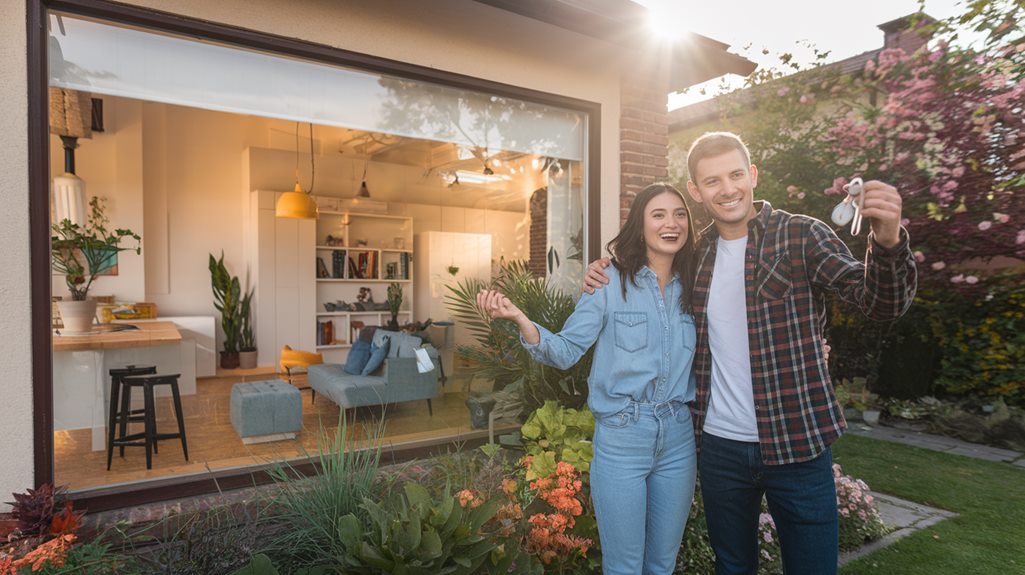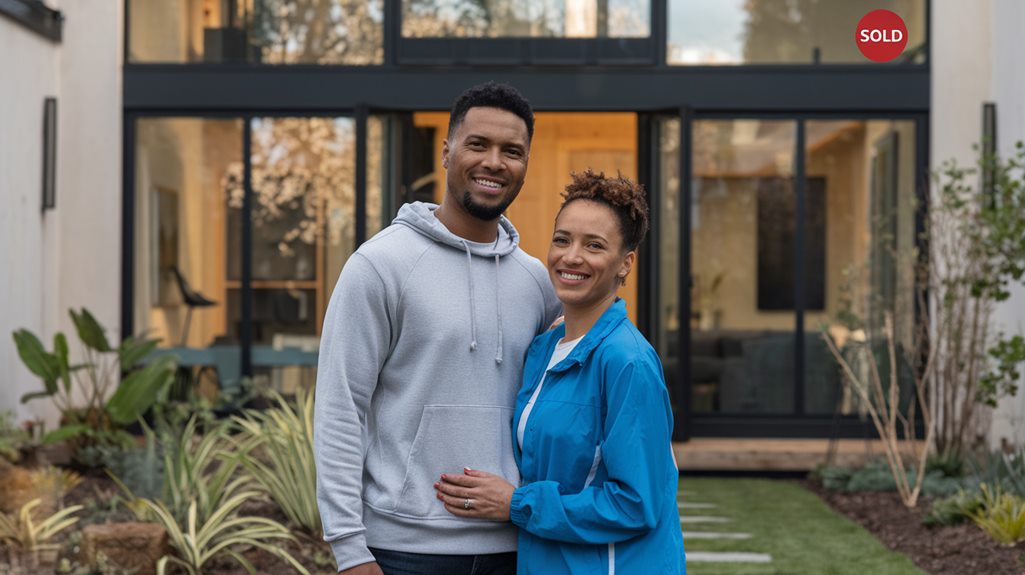Buying your first home can be exciting! First, you need to look closely at your money. Check your credit score to see how good it is. Try to pay off any big debts that have high interest. Make a budget to know how much money you have coming in and going out.
Next, get pre-approved for a mortgage. This helps you know how much money you can borrow. It's also good to find a friendly real estate agent. They can help you understand what houses are like in your area.
When you start looking for a house, make a list of what you want. But remember, you might need to change your mind a little. Sometimes, you'll need to talk with the sellers about the price.
When you make an offer on a house, think about what similar houses sold for. Be ready for the sellers to give you a different offer. This way, you can find a great deal!
With these steps, you're getting closer to finding your dream home!
Ready to start building equity in your own Michigan home? Get your personalized home loan quote today.
Assess Your Financial Situation

Before you start looking for a new home, it's smart to check your money situation. First, look at your credit score. A good score can help you get better loan options.
Next, make a savings plan that fits your goals. It's also important to have some money saved up for emergencies, just in case something unexpected happens.
Try to pay off any debts that have high interest. This will help you feel better about your money. Make sure your job gives you steady income so you can pay your future mortgage easily.
You can use simple budgeting tools to keep track of what you spend and save.
Buying a home can be a good investment, but make sure it fits into your money plans. With some good preparation, you'll feel ready to start your home-buying adventure!
Michigan residents, unlock the door to your new home. Request your home loan quote from Treeside Financial today.
Determine Your Budget
To figure out your budget, start by looking closely at your money. Check how much you earn and what you spend each month.
Write down your expenses so you can see what you can afford. Next, look for different loan options.
Compare their rates and terms to find one that works well with your budget and future plans.
Assess Financial Situation
Understanding your money is the first step to buying a home. Start by checking your credit score. This score affects how much you pay for a loan.
You might be closer to buying your home than you think
Take our 2-minute home buyer readiness quiz to see how prepared you really are – no credit check required.

Next, learn to manage your debts so you don't feel stressed by bills. It's also important to save money. Try to have some extra cash for surprises, like a broken pipe or a car issue. Lenders like to see that you can handle your money well.
Keep an eye on housing trends to find homes that are good investments. A strong financial situation helps you get a loan and gives you an advantage when you talk about prices.
Calculate Monthly Expenses
Knowing how much money you spend each month is very important when you want to buy a home. Start by writing down all your costs. Think about things you pay for every month, like rent, utilities, and insurance.
Also, include costs that can change, like groceries and fun activities. Keeping track of these expenses helps you see how much money you have and where it goes.
Remember to save some money for unexpected things. This way, you'll be ready for surprises that life throws your way. When you know how you spend your money, you can find places to save more. This will make buying a home easier.
When you talk to banks or try to negotiate the price of a home, knowing your budget will help you make smart choices. It will also help you feel good about moving into your new neighborhood.
Explore Loan Options
When you're thinking about getting a home loan, it's important to look at all your choices. This helps you find a budget that works for you and your money goals. Here's how to get started:
1. Interest Rates & Loan Terms: Think about fixed rates for steady payments. If you think your money might change a lot, look at adjustable rates. They can change how much you pay each month.
2. Government Loans vs. Private Lenders: Government loans can be good for first-time buyers. They usually have good terms. Private lenders might be more flexible and can help in different ways.
3. Down Payment & Closing Costs: Make sure to include these in your budget. A bigger down payment can save you money on interest later.
Closing costs can be different, so check what they'll be.
4. Negotiate: Talk to lenders about the terms. You can often get a better deal that fits how you want to live in your community.
Get Pre-Approved for a Mortgage

Getting pre-approved for a mortgage is an important first step when buying a home. It helps you understand how much money you can spend. This makes it easier to find a home that fits your budget.
Start by looking at different types of mortgages. You can choose a fixed-rate loan, an adjustable-rate loan, or an FHA loan. Each one has different rules and interest rates. This can change how much you pay each month and how much the home will cost in total.
When you get pre-approved, it shows sellers that you're serious about buying. This can make your offer better when there are many buyers. It also helps you avoid falling in love with a house that costs too much.
Knowing your budget helps you feel confident. It makes sure you can find a home where your dreams can come true.
Find a Real Estate Agent
When you're ready to find a real estate agent, look for someone who knows a lot about the houses in the area you want.
They can help you find homes that are just right for you. They can also give you tips to help you make better deals.
It's important to ask about how they get paid before you start working together. This way, there won't be any surprises later!
Choose Experienced Professionals
Buying a home can feel really big and scary, but having a smart real estate agent can help a lot. They know the market and can give you great advice.
To make your home-buying journey easier, it's important to choose experienced people to help you:
- Real Estate Lawyer: They make sure all the papers are right and help with things like title insurance and closing costs.
- Home Inspector: They check the house for problems so you can protect your money.
- Mortgage Broker: They find the best loans for you, matching them with your money needs.
- Property Appraiser: They help you see if the price of the house is fair based on what's happening in the market.
Having these experts on your side makes it easier to negotiate and helps you feel like you have a great team supporting you.
Understand Commission Structures
When you have a smart team with you, the next step in buying a home is to understand how real estate agents get paid. Real estate agents usually earn money from a commission. This is a small part of the home's sale price. This money is shared between the agent who helps the buyer and the agent who helps the seller.
Knowing how this works helps you see what you're paying for, and it helps you talk to your agent about what you want. Agents want to close deals quickly and find homes that are just right for you.
When you understand how they get paid, you can make better choices and have a good relationship with your agent. This knowledge is really important as you look for a home. It helps you feel sure and connected during the home-buying journey.
Start House Hunting

Starting your journey to find a new home can be exciting! To make good choices, it's important to be ready.
First, look into different neighborhoods. You want to find a place that feels right for you and matches what you like. Think about what kind of home you want too. Do you like a small house or a modern apartment? Knowing what you want will help a lot.
Here are four simple steps to help you:
- Make a List: Write down what you really want in a home and what you don't want.
- Use the Internet: Check out apps and websites to see homes for sale and take virtual tours.
- Go to Open Houses: Visit houses that are for sale. Walk around and ask questions to learn more.
- Practice Talking: Get comfortable talking with sellers about the home and what you want.
Happy house hunting!
Make an Offer
When you find a house you really like, it's time to make an offer! First, check out what other houses nearby have sold for. This will help you know what a fair price is. It's important to make a good offer that shows you care, but also one that makes sense for you.
Think about including some rules in your offer to keep yourself safe. These rules can help if something goes wrong, like needing a loan or wanting to check the house for problems.
It's normal for sellers to respond with a different offer, so be ready to talk about it more. Stay open to changes, but also know what you can afford.
Your real estate agent is there to help you. They know a lot about buying houses and can guide you through this process.
With the right approach, you'll be one step closer to calling that lovely house your home!
Close the Deal

Buying your first home is super exciting! But it's also really important. You need to pay close attention and be a good negotiator.
Here are some easy tips to help you:
- Learn to Negotiate: Look at what houses in your area sell for. This helps you get the best price and good terms.
- Check Closing Costs: These can be surprising! Look closely at the costs and see if you can ask the seller to help pay some.
- Do a Final Walkthrough: Walk through the home one last time to make sure everything is how you agreed. Check for any repairs that still need to be done.
- Sign the Closing Papers: Before you sign anything, make sure everything is correct. This is your last chance to ask questions or fix problems.
Happy house hunting!








